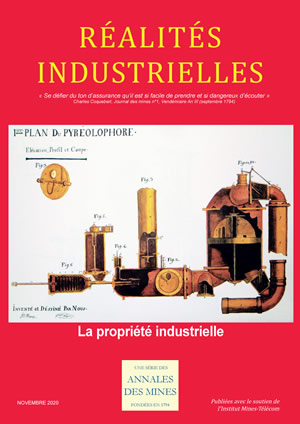| |

|
|
 Novembre 2020 - La propriété industrielle Novembre 2020 - La propriété industrielle
Qu’est-ce qu’un titre de propriété industrielle ?
Par Florence GALTIER
Directeur des affaires juridiques et financières de l’INPI
et
Maxime BESSAC
Chargé de missions juridiques à l’INPI
Véritables moteurs du développement économique, l’innovation et la création industrielles, immatérielles de nature, bénéficient d’une reconnaissance et d’une protection par le droit se matérialisant par la délivrance d’un titre de propriété en contrepartie de leur dépôt auprès de l’Institut national de la propriété industrielle (INPI) et de leur mise à la connaissance du public. Le titulaire d’un brevet d’invention, d’une marque ou d’un dessin ou modèle, dispose ainsi d’importantes prérogatives sur son innovation ou sa création, dont un droit exclusif d’usage. Ce droit de propriété est limité à l’espace national et dans le temps, son maintien en vigueur étant conditionné au versement de redevances et à son exploitation. À l’expiration du titre de propriété industrielle, la création ou l’innovation concernée tombe dans le domaine public.
 Télécharger gratuitement l'article Télécharger gratuitement l'article
 Retour au sommaire Retour au sommaire
 November 2020 -Industrial property November 2020 -Industrial property
What is an industrial property right?
Florence Galtier,
director of Legal and Financial Affairs, INPI,
and
Maxime Bessac,
adviser on legal matters, INPI
As the driving force in economic development, innovation and creation in industry are immaterial by nature. They are legally recognized and protected in France through the grant of a property right as a counterpart to their filing at the French Patent and Trademark Office (INPI) and their disclosure to the public. The owners of patents, trademarks or other industrial property rights thus enjoy major prerogatives related to their inventions or creations, including exclusive use rights. These rights are limited to the national territory and in time, their use and the payment of fees keep them in force. When they expire, the protected creation or invention falls into the public domain.
 Retour au sommaire Retour au sommaire
|
|




